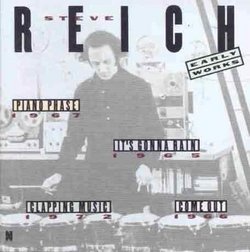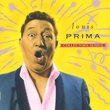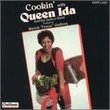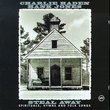| All Artists: Steve Reich, Double Edge Title: Steve Reich: Early Works Members Wishing: 5 Total Copies: 0 Label: Nonesuch Release Date: 5/28/1992 Genres: Dance & Electronic, Jazz, Special Interest, Classical Styles: Techno, Experimental Music, Chamber Music, Historical Periods, Modern, 20th, & 21st Century Number of Discs: 1 SwapaCD Credits: 1 UPCs: 075597916928, 075597916942, 603497092062 |
Search - Steve Reich, Double Edge :: Steve Reich: Early Works
 | Steve Reich, Double Edge Steve Reich: Early Works Genres: Dance & Electronic, Jazz, Special Interest, Classical
The disc is titled Early Works. Come Out (1966) and It's Gonna Rain were the first Reich compositions released on LP, electronic works based on tape-recorded voices processed in fairly simple but intriguing ways. The hypno... more » |
Larger Image |
CD DetailsSynopsis
Amazon.com The disc is titled Early Works. Come Out (1966) and It's Gonna Rain were the first Reich compositions released on LP, electronic works based on tape-recorded voices processed in fairly simple but intriguing ways. The hypnotic power of Come Out was the first Reich to catch my attention years ago. Piano Phase and Clapping Music use the same musical procedures, only for live performers. I don't know if this is an important disc except for people following Reich's career, but though he has gone on to greater things, these pieces still have the power to intrigue and move me. --Leslie Gerber Similarly Requested CDs
|
CD ReviewsFundemental for an understanding of reich's later works tonetwelve | poughkeepsie, ny | 09/14/2002 (5 out of 5 stars) "whether you are new to classical music, or minimalism, or to steve reich, this recording is essential to obtaining a further knowledge of where reich has come from. included on this disc are four pieces:1) come out. this is where reich begins to experiment with tape loops, using one repeated phrase, on more than one reel to reel tape machine. the phrase is drawn slowly out sync on one player, while the other player maintains its original speed (this happens on two tape players naturally). the result to begin with, is an echo, a slight reverberation. then proceeds to what sounds like delays. the process continues until the phrases come back into sync with each other.2) piano phase: this is reichs adaptation of the phrase syncing he pioneered in 'come out' for piano. he begins with one 12 note melodic fragment formed on five pitches (the pattern is this: e, f#, b, c#, d, f#, e, c#, b, f#, d, c#) which is played by two performers (in this case the duo 'double edge') in synchronicity with each other. they begin to move out of phase with each other (one speeds up slightly, while the other maintains a steady tempo) until they are one note apart...repeat the process until two notes, then three, then four...until they are back in alignment again. this is repeated with two other melodic fragments, and then the piece ends.3) clapping music: another jump in reichs evolution. he takes the idea of phase modulation, and removes the transitory sections (the speeding up) and just jumps one performer ahead to the next pattern. the pattern used is one which reich takes with him throughout his works (to name a couple, it can be found in 'music for 18 musicians, and music for pieces of wood). the recording here features steve reich, and russ hartenberger (founding member of the percussion group 'nexus')4) it's gonna rain: this was reichs first piece to ever deal with tape loops, and with gradually shifting phases. it has a lot of the same elements as 'come out'reichs music follows in some of the theoretical philosophies of john cage (among others) who said "if something is boring after two minutes, try it for four. if still boring, then eight. then sixteen. then thirty-two. eventually one discovers that it is not boring at all."reich does just that. his music has often been referred to as process oriented, because it deals so much with a process, rather than piles of notes. his music is not for everyone, but for those who can put down preconceptions, and venture into new musical realms, reichs is some of the most rewarding there is." Timeless Minimalism!! Louie Bourland | Garden Grove CA | 09/12/2003 (5 out of 5 stars) ""Early Works" collects four of composer Steve Reich's earliest examples of minimalist music for both tapeloops and actual musical instruments. Listening to these early pieces is quite fascinating and offers a glimpse of what was to come in the music world more than 35 years later. The first piece on the disc, "Come Out" was created in 1966 as part of a benefit for six youngsters who were arrested in the infamous Harlem riots. Reich's source material for this piece consists of a spoken phrase by a young man named Daniel Hamm. Reich takes two identical tapeloops Hamm's phrase ("Come out to show them") and allows them to gradually go out of synch with each other. As they do, the charachteristics of the human speech become more revealing as every detail of the 'come out' phrase becomes exposed. As the piece gradually moves forward, Reich doubles the loops to four and allows them to go out of synch thus adding further depth to the repeated phrase. Finally, the four loops double to eight and the phrase becomes indecipherable but highly rhythmic like a percussionist using brushes on a snare drum. 37 years later, "Come Out" can very well be considered as the first 'rap' or 'hip-hop' piece. It's repeated rhythmic tapeloops are an early example of what is now known as 'sampling'. The second piece is "Piano Phase" composed in 1967. The principle behind this piece is having two pianists starting a repeated phrase together in unison but gradually having one pianist get a beat ahead (then two and three beats etc.) of the other pianist thus creating entirely new melodic and harmonic rhythmic patterns. This is an excellent 20-minute study of what can be done with two pianos playing the exact same thing but at different intervals. The third piece is the short but effective "Clapping Music" composed in 1972. This piece was written for two pairs of hands clapping out a simple elementary rudiment. Like "Piano Phase", one performer plays the same thing throughout while the other jumps ahead a number of beats. On a personal note, this is an excellent piece to teach your friends. It's fun and simple to learn. The final piece is "It's Gonna Rain" which is the earliest piece in this collection, created in 1965. This is another tapeloop piece in the style of "Come Out". The source material was recorded by Reich in a park in San Francisco and the voice belongs to a street preacher by the name of Brother Walter. "It's Gonna Rain" is presented in two parts. The first part consists of Walter's phrase 'it's gonna rain' in a repeated loop. At first there are numerous rhythmic edits in the loops showcasing the different parts of diction and pitch in the one phrase. Then an identical loop of the same phrase cuts in and gradually goes out of synch with the other. When the two loops are as far out of synch as possible, this creates a sort-of teetertotter-like effect. The loops then gradually fall back in synch which concludes the first part of this piece. Part two's structure is almost the same as the first part but in this case, a longer compilcated loop consisting of several different phrases from Brother Walter is used. Like "Come Out", this part begins with two identical tapeloops played together in unison but then gradually go out of synch. The two loops double to four and gradually go out of synch followed by the doubling to eight loops. As the eight loops go out of synch, the sound of the piece becomes extremely chaotic - a cacophony of voices that sound as if they are in a large echo chamber. This brings "It's Gonna Rain" to a chilling close. Without a doubt, Steve Reich is a composer that was and still is ahead of his time. His early tape experiments included on this disc have paved the way for today's DJs and electronic musicians. This music does require some patience, study and understanding. Not everyone will grasp this music upon its first listen. However, there's is no argument that this music is timeless and demonstrates the young Steve Reich coming into full bloom as a dynamic and innovative composer." It's Gonna Rain John D. Dooley | Southern California United States | 04/21/2003 (4 out of 5 stars) "Warning, this is a strange CD. It's not going to fit everyone's taste, but if you are the type that likes to explore, or extremely bored with POP music, then this is the CD for you. This was created & recorded before the computer age, yet deals with the process of the computer age. Back then some Classical Experimenters used tape loops to created multi layered repetitions of rhythm & melody. I believe the high light is "It's Gonna Rain" from a recording of a Pentecosta street preacher yelling about Noah's flood. The words "Its Gonna Rain" become rhythm with something like: "Its Its, Its Gonna Its Gonna, Gonna Gonna, Gonna Rain Gonna Rain, Rain Rain...then the piece adds layers of layers of the sermon until it becomes a vast sound effect. Believe it or not I played "It's Gonna Rain" during a Performance Art piece called "Noah's Art" where I gave out water balloons & pistols to an audience while reading & then acting out the 10 commandants. The Tape loop was used to drive everyone into a frenzy to drown me with water. It Worked. Thanks Steve."
|

 Track Listings (5) - Disc #1
Track Listings (5) - Disc #1



